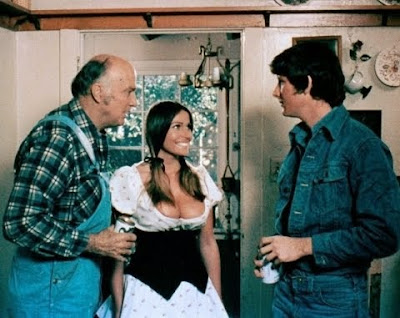Milk
Harvey Milk is sitting alone in his kitchen in the wee hours one night late in 1978, days before the bullets fired by fellow city supervisor Dan White would end his life. Milk speaks into his tape recorder, recounting the events since his decision to move to the West coast and enter into politics. He pauses a lot, allowing various expressions to pass over his face. A lot of history. A lot of progress, but far yet to travel. He seems to know somehow that his candle is soon to be snuffed out. But that goes with the territory when you're a controversial politician who rocks the Establishment. Especially when you're an outspoken homosexual in the 1970s. Even in San Francisco.
In MILK, Gus Van Sant's biopic of the first gay man to be elected to public office in the U.S., Sean Penn transforms his usual scowling public persona into a gentle yet driven man who managed, with unfailing tenacity and optimism, to win over the constituents of a broadening radius of districts. The Castro. Haight-Ashbury. Duboce Triangle. Noe Valley. Each eventually responded to his pleas for the most basic of rights for those who shared his orientation. He marched and rallied and organized tirelessly. His calm demeanor allowed him to win over working class Democrats who may not have approved of his sexuality, but most certainly appreciated his lobbying for liberal causes. It wasn't all about gay rights, you see. Milk was a politician, through and through. His meekness also allowed him to quell potential riots. With a bullhorn, yes, but never screaming invective, never encouraging anyone to break the law.
It is an uphill battle. SF is the town, gay-friendly as long as many can remember, but apparently it wasn't always such. When Milk first arrives in the early 70s to open a camera store in The Castro, he is greeted by immediate homophobia from the owner of the liquor store across the street. The police regularly beat the vagabonds, mainly lost boys turning tricks, runaways. Those dispossessed from conservative bastions like Phoenix and Minneapolis. Milk finds his voice, and his office, but not before three unsuccessful bids. Unfazed, he encourages his supporters to come out, and not quietly. For all the world to see. He loses friends and a close companion along the way. Anita Bryant mounts her anti-gay campaign, initially finding resounding victory in Miami, and making her way West.
White (Josh Brolin) worked in the same office as Milk. He always appears uncomfortable around Harvey, reasons for which are (subtly) suggested that perhaps beneath his conservative exterior was someone who shared more than one thing with his colleague. He protests a bit too loudly that he is a decent family man with godly values. Just who is he trying to convince, anyway? It may not matter. Milk refuses to play the quid pro quo games of politics with White, leading White's pet causes like a new psychiatric center to go unfunded. More slights occur, real and imagined. Harvey Milk grows more popular as he fights for gay schoolteachers to keep their jobs. White loses his grip. Soon Milk and Mayor George Moscone, sympathetic to Milk's causes, will be gunned down.
What we have in MILK is compelling storytelling. Dustin Lance Black's screenplay tracks most of the major events in Milk's political life, interspersing some colorful characters (and details). Harvey Milk's support staff included the fiery Cleve Jones (Emile Hirsch), who intensely describes the gay revolution he witnessed in Spain, clearly interested in bringing some of that energy home. Milk realizes this is the man to help spread the word. We also meet Anne Kronenberg (Alison Pill), a veteran campaign manager and unrepentent lesbian. This amusingly causes some discord among Milk's all-male staff, who were often accused of being misogynist. Each element of the script allows what often feels like a voyeuristic look into the back rooms, city halls, and offices of the players. The best films feel this way, like you are intruding. Van Sant's fluid direction is underplayed enough to not draw attention to technique yet remains stylish and inventive. The device of having Harvey recall his later life throughout the film never feels gimmicky, instead adding a poignancy to the story.
Underplayed is also the descriptor for Penn's stellar work here. I was expecting a lot of shouting, ranting, hateful spewing. Also, flailing arms, melodrama. Not here. Penn is so natural in this role that I honestly did forget it was him for long stretches. The peaceful character is fully embodied by Penn, played to perfection. He does what every actor should do, adopt the "Less is More" mantra. As well, he is unafraid to look unattractive. How many actors obsess over the way their faces and bodies look in anamorphic? How their screen personas will affect their careers? Penn never cares. He'll adopt hilarious afro wigs, riddle his face with craters or wear crooked false teeth to get the look. Then he'll rumple his posture to project fear in his weakest moments as Harvey Milk. Then he'll hold his head high.
If Harvey Milk had lived to see the events of 2008, when an African American was finally elected as President, he would have cheered. I suspect he would have also sighed in agreement with the (perhaps unfair) statement that "being gay is now the new black" after yet another Proposition was passed.



Comments